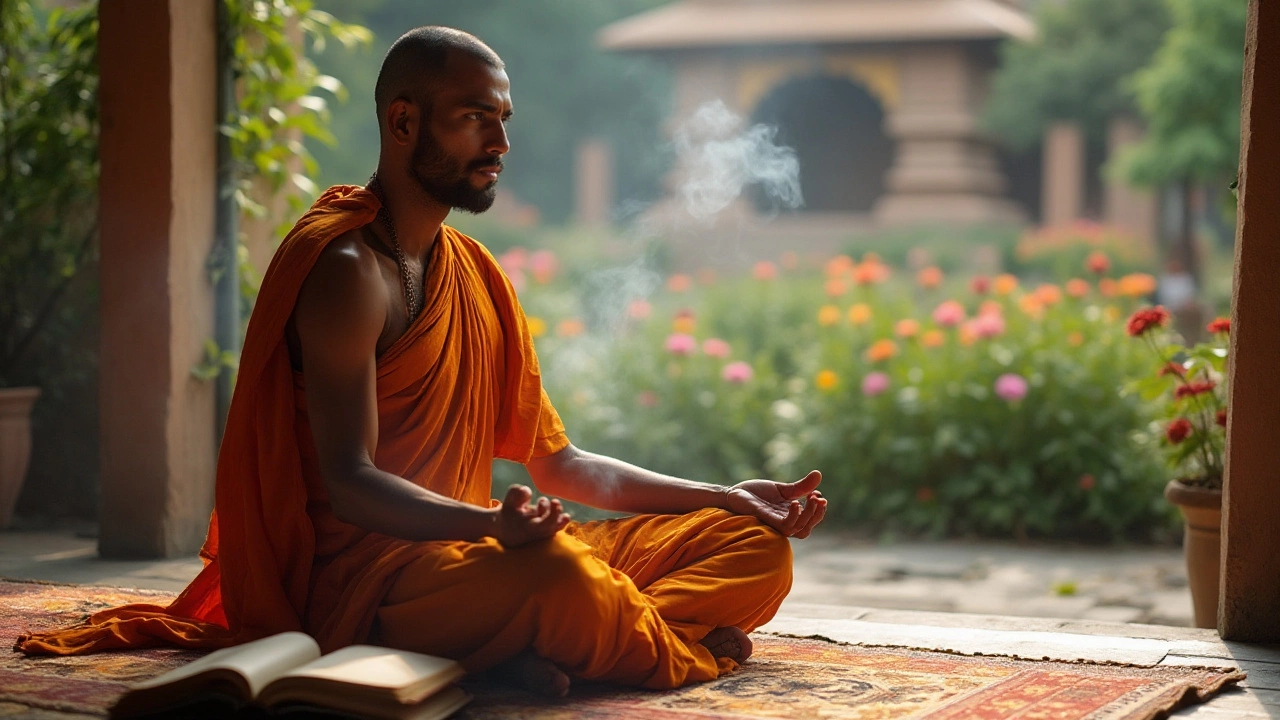India, a land where spirituality gracefully intertwines with daily life, offers a wealth of wisdom that resonates through centuries. Her sacred texts and teachings present profound insights into the nature of existence and consciousness. Spiritual quotes from India often reflect a harmonious balance between the physical and metaphysical, encouraging introspection and a deeper understanding of the self.
By examining these transformative quotations, we glimpse India's rich spiritual landscape—one that has nurtured countless seekers and sages. This ancient wisdom continues to inspire and guide many, offering solace and enlightenment in an ever-changing world.
- The Soulful Connection: Understanding India’s Spirit
- Ancient Wisdom: Timeless Quotes from Indian Minds
- Unity in Diversity: Embracing Spirituality in Daily Life
- Bringing It Home: Personal Reflections on Indian Spirituality
The Soulful Connection: Understanding India’s Spirit
India's spirit is a captivating tapestry woven together through ancient traditions and spiritual consciousness, offering profound wisdom in its spiritual quotes. To truly understand the essence of India's spirituality, it is vital to explore the philosophies and practices embedded in daily life across its diverse cultures. The presence of spirituality can be felt everywhere—from the bustling streets of Varanasi to the serene ashrams of Rishikesh, this connection pervades the landscape, influencing actions and thoughts in both subtle and overt ways. Spirituality in India is not confined to religious practices alone; it transcends boundaries, inviting people to look beyond the material world and seek an inner truth. The teachings of sages like Swami Vivekananda and Maharishi Patanjali, and figures such as Mahatma Gandhi, have left an indelible mark on the spiritual framework of India. Their messages of peace, love, and understanding continue to enlighten seekers globally.
"The great secret of true success, of true happiness, is this: the man or woman who asks for no return, the perfectly unselfish person, is the most successful." - Swami VivekanandaThis quote by Swami Vivekananda encapsulates the notion of giving without expectation—a principle deeply valued in the spiritual fabric of India. The country's spiritual philosophies often emphasize the impermanence of life, urging individuals to detach from transient desires and focus on self-realization. Practices like meditation and yoga exemplify this focus, aiding individuals in their journey towards consciousness and self-awareness. Each practice, whether it's an hour of yoga at sunrise or quiet meditation by the Ganges, fosters a connection to one's inner self, reflecting the robust spiritual tapestry of India. As people from around the world come to experience these powerful traditions, they are often captivated by the transformative potential they hold.
The sense of unity in diversity among India's spiritual teachings is a testament to its inclusive nature. Across different religions and regions, themes of compassion, karma, and dharma recur, demonstrating the strong spiritual journey inherent in Indian culture. These universal ideas are articulated through countless stories, art forms, and rituals that make up the cultural mosaic of India. As globalization bridges cultural gaps, Indian spirituality has found its way into many parts of the world, urging individuals to not only seek change in the external world but to also nurture inner growth. It stands as a reminder of India's unique spirit, always inviting introspection and growth.

Ancient Wisdom: Timeless Quotes from Indian Minds
India's spiritual heritage is a treasure trove of wisdom, carried forth through timeless quotes that have transcended ages. These words, emanating from the deep introspection and rich experiences of ancient Indian sages, come enveloped with guidance and enlightenment. One cannot discuss Indian spirituality without highlighting the influence of the Vedas and Upanishads, which offer profound philosophical insights. While different texts highlight various aspects of existence, they collectively emphasize the importance of understanding inner consciousness as the true essence of one's being.
Consider the words of the enlightened sage, Swami Vivekananda, who said, "Arise, awake, and stop not till the goal is reached." This quote encapsulates India's spiritual ethos of perseverance and relentless pursuit of knowledge. Across the land, myriad saints and scholars have contributed their perspectives, which collectively portray this diverse spirituality. Yet, all share a common thread—striving for unity with the larger universe. Ancient India was never about rigid dogmas but embraced life's multiplicity.
Exploring texts such as the Bhagavad Gita unveils dialogues replete with wisdom exemplifying spirituality in India. Here, Lord Krishna provides Arjuna with spiritual guidance, stirring inner reflection and transcending material world's distractions. The Gita stresses detachment, selfless action, and devotion. These teachings nudge individuals to explore inner depth and manifest a life of purpose and clarity. Additionally, quotes from the Panchatantra and Jataka tales offer moral lessons wrapped in enchanting stories, engaging minds through example rather than preaching.
An example of India's impactful sayings is, “The ignorant work for their own profit, Arjuna; the wise work for the welfare of the world, without thought for themselves." This Bhagavad Gita quote reminds us to act selflessly, elevating the notion of collective happiness above personal gains—a philosophy deeply rooted in Indian tradition. Such quotes are not mere words but carry essential truths, enhancing one's spiritual journey. They bridge ancient philosophies with contemporary lives.
"You must be the change you wish to see in the world," attributed to Mahatma Gandhi, further underpins this notion, urging individuals to lead by example and embody the changes they aspire to see. This perspective aligns with the holistic approach Indians have towards spiritual consciousness, comprising love, peace, and harmony.
Delving into these Indian wisdom pearls draws a vivid picture of a culture steeped in spirituality. They embolden people to venture inward, fostering personal transformation, and sharing that light with the world. This spiritual tapestry, woven over millennia, continues to guide spiritual seekers, helping them navigate life's myriad paths, filled with ancient lessons that remain relevant, leading individuals toward a harmonious and fulfilled life.

Unity in Diversity: Embracing Spirituality in Daily Life
In India, spirituality is not confined to temple walls or sacred rituals; it permeates the daily rhythms of life. This cultural tapestry of myriad beliefs and practices illustrates the beautiful complexity of unity in diversity. Regardless of the varied ways in which spirituality is practiced, the end goal remains remarkably similar across different traditions: achieving inner peace and harmony. Whether it’s the morning prayers resonating from mosques or the gentle ringing of temple bells, these daily sights and sounds remind the people of the deeper connection shared across faiths.
The idea of unity is truly Indian at its core, seen clearly in the holy festivals celebrated with exuberance across the country. Diwali, Christmas, and Eid become community events, celebrated by diverse groups that reflect the national fabric. This sense of oneness in spirituality emphasizes shared human values, like empathy and joy, over disparate religious doctrines. By integrating spirituality into everyday actions, individuals cultivate a mindful way of living, one that recognizes the sanctity of life in all its forms.
"Truth is one; sages call it by various names." – Rigveda
In homes, spiritual practices are subtly woven into the routine, from lighting lamps and incense to taking a moment of silence before meals. Each family, regardless of its specific religious background, engages in certain rituals that honor life's abundance and express gratitude. For many Indians, spirituality is akin to brushing teeth or sharing meals, it happens naturally and seamlessly. This deep-rooted tradition of embracing spiritual values manifests famously in the principles of ahimsa (non-violence), and these values are evident in daily interactions.
Further illustrating this unity is the common practice of yoga and meditation, which transcends religion and acts as a spiritual exercise uniting body, mind, and soul. With countless yoga practitioners globally, this ancient Indian practice highlights how spirituality does not just shape cultural identity but also enhances well-being universally. Such practices remind followers to pursue balance among their mind, body, and spirit continuously, creating inner peace that reflects on external actions.
Statistically, India is home to over two thousand distinct ethnic groups, speaking various languages within its borders, yet spirituality often bridges the linguistic and cultural divides. Table below provides a glimpse into this intricate cultural mosaic:
| Language | Number of Speakers (Millions) |
|---|---|
| Hindi | 528 |
| Bengali | 97 |
| Telugu | 82 |
| Marathi | 83 |
This unique synthesis of diversity and spiritual tenets not only weaves a compelling narrative of coexistence but also offers a lesson in acceptance. Thus, embracing spirituality in daily life cultivates a serene existence, where each moment is an opportunity to connect with the bigger cosmos. The Indian way teaches us that by nurturing a profound respect for all forms of life and embracing differences, we can indeed live in harmony with one another.

Bringing It Home: Personal Reflections on Indian Spirituality
Over the years, my understanding of Indian spirituality has grown, enriching my life's tapestry in unexpected ways. India, with its rich heritage of diverse spiritual practices, offers a treasure trove of insights that resonate deeply with the human experience. The country's sacred traditions emphasize the journey within, guiding individuals to find harmony between their inner and outer worlds. As I dive deeper into these practices, I realize that spirituality in India isn't confined to grand rituals or exotic locales but is embedded in the simplicity of daily life, encouraging us to live with awareness and compassion. It's the small acts, like lighting a diyā in the evening or offering a silent prayer at dawn, that create a sense of connection with something larger than life.
Indian spirituality teaches us to embrace all aspects of life with grace and equanimity, recognizing the divine in every moment. From meditating by the serene banks of the Ganges to reflecting in the quietude of rural ashrams, these experiences become a part of a larger narrative that speaks to the soul. As one explores various philosophies and texts, such as the Upanishads and the Bhagavad Gita, there emerges an understanding that the essence of spirituality is to transcend ego and nurture a universal love and unity. In the words of the revered Swami Vivekananda,
"Arise, awake, and stop not till the goal is reached."This quote serves as a reminder that the spiritual path is ongoing, urging us to keep seeking and exploring the depths of our being.
Engaging with these affirmations shapes not just personal growth but also defines how we interact with the world around us. The teachings uplift the mind, imbue everyday tasks with meaning, and foster a sense of purpose and peace. In a world bustling with technological advances and societal changes, this ancient wisdom remains a guiding light. It's astonishing how practices that originated thousands of years ago can still offer solace and insight today. As I reflect on my spiritual journey, I find immense joy and tranquility in living mindfully, integrating age-old principles into modern living, and cherishing the delicate dance of tradition and innovation.
The profound simplicity of India's spiritual heritage imparts lessons relevant for all walks of life. Whether sitting quietly in meditation, engaging in vibrant kirtan, or simply listening to the silence, each moment becomes an opportunity to connect with the divine presence within. This spiritual revolution begins with an individual but ripples across communities, knitting us together in a shared quest for truth and understanding. Engaging with India’s spiritual quotes and teachings is a continuous journey, opening pathways to endless exploration and self-discovery. Indeed, this journey is not merely about reaching a destination but finding a way to integrate the profound beauty of Indian spirituality into everyday existence.
